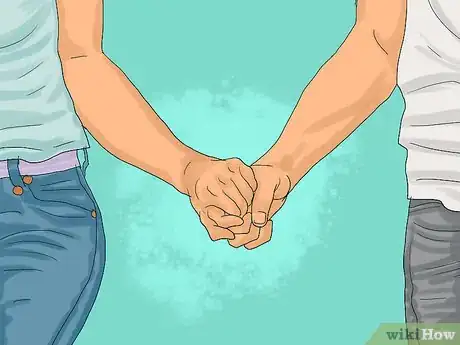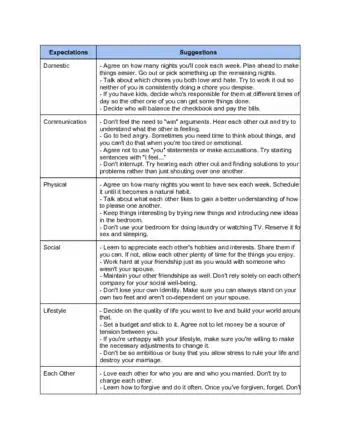This article was co-authored by Klare Heston, LCSW. Klare Heston is a Licensed Independent Clinical Social Worker based in Cleveland, Ohio. With experience in academic counseling and clinical supervision, Klare received her Master of Social Work from the Virginia Commonwealth University in 1983. She also holds a 2-Year Post-Graduate Certificate from the Gestalt Institute of Cleveland, as well as certification in Family Therapy, Supervision, Mediation, and Trauma Recovery and Treatment (EMDR).
wikiHow marks an article as reader-approved once it receives enough positive feedback. In this case, 92% of readers who voted found the article helpful, earning it our reader-approved status.
This article has been viewed 1,279,365 times.
There is no one-size-fits-all formula for being a wonderful husband. Every partner and every marriage is different. But there are some common issues that many married couples face, and part of being a great husband is being able to navigate and deal with these issues. In general, being a great husband involves treating your partner with love, growing together with them, and keeping the lines of communication open.
Steps
Treating Your Partner with Respect
-
1Be honest with your partner about your thoughts and feelings. In a mature relationship, honesty is the best policy. It may be difficult, but the truth will allow relationships to breathe. If something doesn't suit them let them know, otherwise they will not trust your opinion.[1]
- Suggest an alternative and attach praise to the alternative. For example, if they ask you if you like clothing they are trying on, let them know that it might work but you think the blue one is your favorite so far because it matches their eyes.
- It might not always be easy to be honest and kind at the same time, so focus on learning how to give a feedback sandwich and you'll both be better off.
-
2Communicate with your partner openly. As relationships progress, it can be tempting to communicate less and less. Fight this impulse, and be open about your feelings, daily experiences, and finances. Make sure you're actually listening, not just waiting for your turn to talk. Put off a vibe that tells your partner that they can tell you anything.[2]
- Tell your partner what you think, and don't assume they can read your mind. When you think they look nice, tell them. When you are thinking you are lucky to have them, tell them. Just like you, they'll like hearing they're valued.
- Make sure that if you have any problems that will affect your mood (e.g., a bad day at work), they are made aware of the reasons for your problems and mood. This way you will not appear to merely be a fickle and cranky person, and your partner will know that you aren’t mad at them.
Advertisement -
3Do your part around the house. Clean up after yourself after meals and when coming home from working or socializing. Don't make your partner ask you to pull your own weight around the house. This makes them feel like a nag, which is never good. Your spouse is your partner, not your parent. Show them that they can count on you to get things handled.
- Contribute to housework by doing things like washing dishes, vacuuming, and dusting. Your partner will see that you feel you have a vested interest in the home you share and that you take pride in creating a polished environment for both of you to enjoy.
-
4Take responsibility for your actions. This is a great way to show your partner that you possess emotional maturity, and are enough of an adult to face up to your own actions, whether they're good or bad. Responsible people honor their commitments, accept their duties, and are accountable for damages they incur, debts they owe, and claims they make.
- For example, if your partner finds out that you criticized them behind their back, don't make an excuse or deny what happened. Say something like, "It's true that I said those things about you, and I'm sorry. Next time I'm upset by something you've done, I'll bring it up with you first."
-
5Don't brush your partner off. People often find it exasperating when they get the feeling their partner treats them as an inferior in a relationship. A lot of people have been taught that the only way to get attention when their partner is trying to ignore them is to act more emotional and be louder until the partner finally surrenders and pays attention to them, even if in annoyance.
- If your partner feels you’re giving them the cold shoulder, they may get worried, especially when it happens without any explanation from you.
- If you know that your mood might lead you to overreact, simply say "I'm feeling really irritated right now. Can we talk about this later after I cool off a bit?”
-
6Don't show your partner contempt or sarcasm. Contempt and sarcasm can poison a relationship. If your partner does something that doesn't thrill you, do not take on an attitude of superiority, even subtly in passing. Avoid behaviors such as momentary smirking, sighs of disgust, or eye-rolling. Such gestures, though seemingly insignificant, deeply show a lack of support, respect, and trust, especially over a period of time.
- The way you naturally act towards your partner should subtly validate them as a person, even when you do not understand or agree with them.
- If you show contempt in front of your child(ren), your child(ren) will then feel that is an appropriate way to treat your partner.
Showing Your Partner that You Care
-
1Prioritize your partner in your day-to-day life. They are the person you have chosen to spend your life with: treat them as such. Talk with your partner and set clear expectations about what decisions you can make without each other, and what decisions must absolutely be discussed. Ask their opinion when in doubt to show your partner you value their input.
- For example, if you know your partner is cooking dinner at home and a work friend asks you to join them for a quick happy hour, say something like, "I'll join you next time, but I know my partner wanted me to be home for dinner tonight."
-
2Be their greatest supporter. Be someone your partner knows that they can always count on. Be there for them when they have had a long day. Listen to your partner attentively, and encourage them when they face difficult times. Say something like, "I'm sorry you had a tough day at work, but I know you're great at your job and I love how much you pour yourself into whatever task you're working on."[3] You can also support your partner by talking them up to mutual friends.
- If you have done something to hurt them, even if you didn't mean to, tell them you are sorry and show them affection. This must be sincere! There's nothing worse than an "I'm sorry" that is put on or phony.
-
3Take care of your relationship. Relationships are fun and rewarding, but they can also be difficult and take a lot of work to maintain. Invest time and energy in caring for your partner, and for your relationship and family. Your partner may feel overwhelmed with kids, work, or other aspects of their life. Take it upon yourself to support them no matter what they’re going through.[4]
- Help out; cook their favorite food or make their favorite drink. Help with the kids and help around the house (like doing dishes).
-
4Ask your partner what you can do to make things work. Part of being a great husband involves asking your partner if they have any needs you aren't meeting, or if they would like you to contribute to the relationship in ways you’re not. Ask them about what they need to feel loved by you. Try saying something like, "I think that things have been great between us lately. But I'm just curious, is there anything you'd like me to do that I haven't been, or any different ways I can contribute to our marriage?"[5]
- If your partner needs you to give them compliments, learn to master the art of compliments. If they need you to come home on time, be on time. And, if you know that you are going to be late coming home, call them and let them know.
- If your partner needs you to help the children with homework, spend time with the family instead of going out with your friend.
Keeping Romance and Your Sex Life Alive
-
1Be romantic with your partner on a regular basis. What "being romantic" means varies widely from person to person, but at its core, romance involves doing something to express affection in a meaningful yet unexpected way. A true act of romance requires creativity and sincerity, often inspired by love (either its presence or its possibility). Reintroduce the excitement that characterized the beginning of the relationship.[6]
- For example, treat your partner like they're single, and you're trying to earn their affection and trust. The opposite of being romanced is being taken for granted. No one wants to feel like they've already been "caught" and it's over and done with.
- There are millions of ways to say "I love you" and "I'm lucky to have you." Buy flowers, cook them a meal, or surprise them with a quick weekend vacation.
- You might also try re-creating special moments from the early days in your relationship, like revisiting the restaurant where you had your first date.
-
2Keep your sex life invigorated. As years go by, a couple's sex life can begin to feel routine or start to lag. Think of ways to counter this. For example, kiss your partner goodbye in the morning like you don't want them to leave. It gives them something to think about all day. Suggest new ideas to try out in the bedroom, or ask your partner if there's a new sex act, toy, or position that they've been wanting to try out. Be willing to put their pleasure ahead of yours.
- Talk about sex, both what's been working well for the two of you and what hasn't. Intimacy (emotional and physical closeness) is important in maintaining a healthy relationship.
- Sex is even more fun when you build anticipation. Drop a few hints in your partner’s ear early in the day, so that you can both look forward to getting together for some intimate moments after work.
-
3Give gifts as a surprise. Anyone can buy a gift for a birthday, Christmas, or an anniversary. Listen to them when you are out window shopping, and if there is something they like, and it's within your price range, remember it and surprise them with it when they least expect it, for no reason at all.[7] Or pick something up on your way home from work, and tell them you were thinking of them when you saw it.
- The gift doesn't have to be big or expensive. Buying a book you know they will like or a CD by their favorite band is a nice gesture.
Quick Marriage Advice
Expert Q&A
Did you know you can get expert answers for this article?
Unlock expert answers by supporting wikiHow
-
QuestionWhat are the qualities of a good husband?
 Klare Heston, LCSWKlare Heston is a Licensed Independent Clinical Social Worker based in Cleveland, Ohio. With experience in academic counseling and clinical supervision, Klare received her Master of Social Work from the Virginia Commonwealth University in 1983. She also holds a 2-Year Post-Graduate Certificate from the Gestalt Institute of Cleveland, as well as certification in Family Therapy, Supervision, Mediation, and Trauma Recovery and Treatment (EMDR).
Klare Heston, LCSWKlare Heston is a Licensed Independent Clinical Social Worker based in Cleveland, Ohio. With experience in academic counseling and clinical supervision, Klare received her Master of Social Work from the Virginia Commonwealth University in 1983. She also holds a 2-Year Post-Graduate Certificate from the Gestalt Institute of Cleveland, as well as certification in Family Therapy, Supervision, Mediation, and Trauma Recovery and Treatment (EMDR).
Licensed Social Worker
-
QuestionWhat are the signs of a good husband?
 Klare Heston, LCSWKlare Heston is a Licensed Independent Clinical Social Worker based in Cleveland, Ohio. With experience in academic counseling and clinical supervision, Klare received her Master of Social Work from the Virginia Commonwealth University in 1983. She also holds a 2-Year Post-Graduate Certificate from the Gestalt Institute of Cleveland, as well as certification in Family Therapy, Supervision, Mediation, and Trauma Recovery and Treatment (EMDR).
Klare Heston, LCSWKlare Heston is a Licensed Independent Clinical Social Worker based in Cleveland, Ohio. With experience in academic counseling and clinical supervision, Klare received her Master of Social Work from the Virginia Commonwealth University in 1983. She also holds a 2-Year Post-Graduate Certificate from the Gestalt Institute of Cleveland, as well as certification in Family Therapy, Supervision, Mediation, and Trauma Recovery and Treatment (EMDR).
Licensed Social Worker
-
QuestionHow do I become a real husband?
 Klare Heston, LCSWKlare Heston is a Licensed Independent Clinical Social Worker based in Cleveland, Ohio. With experience in academic counseling and clinical supervision, Klare received her Master of Social Work from the Virginia Commonwealth University in 1983. She also holds a 2-Year Post-Graduate Certificate from the Gestalt Institute of Cleveland, as well as certification in Family Therapy, Supervision, Mediation, and Trauma Recovery and Treatment (EMDR).
Klare Heston, LCSWKlare Heston is a Licensed Independent Clinical Social Worker based in Cleveland, Ohio. With experience in academic counseling and clinical supervision, Klare received her Master of Social Work from the Virginia Commonwealth University in 1983. She also holds a 2-Year Post-Graduate Certificate from the Gestalt Institute of Cleveland, as well as certification in Family Therapy, Supervision, Mediation, and Trauma Recovery and Treatment (EMDR).
Licensed Social Worker
References
- ↑ https://www.allprodad.com/10-tips-for-becoming-a-better-husband/
- ↑ https://www.huffingtonpost.com/shawn-doyle/10-ways-to-be-the-husband_b_12186364.html
- ↑ https://www.allprodad.com/10-tips-for-becoming-a-better-husband/
- ↑ https://www.huffingtonpost.com/charli-penn/the-provider-the-rock-you_b_1373274.html
- ↑ https://goodmenproject.com/featured-content/6-ways-to-be-a-great-husband-my-wifes-list-dg/
- ↑ https://www.huffingtonpost.com/shawn-doyle/10-ways-to-be-the-husband_b_12186364.html
- ↑ https://goodmenproject.com/featured-content/6-ways-to-be-a-great-husband-my-wifes-list-dg/
- ↑ https://www.huffingtonpost.com/shawn-doyle/10-ways-to-be-the-husband_b_12186364.html












































































